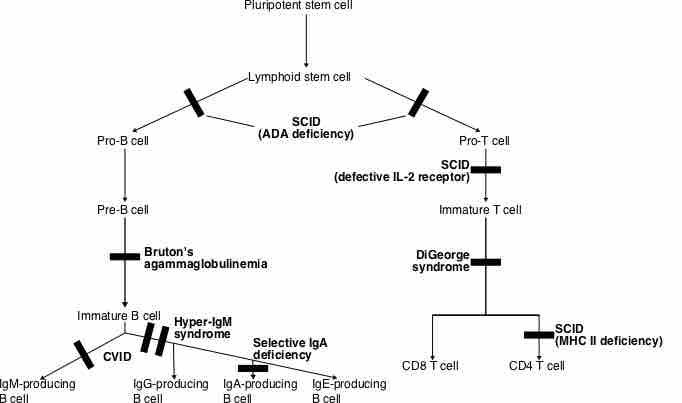Immunodeficiency (or immune deficiency) is a state in which the immune system's ability to fight infectious disease is compromised or absent entirely. Immunodeficiency may also decrease cancer immunosurveillance. Most cases of immunodeficiency are acquired (secondary) but some people are born with a defective immune system, or primary immunodeficiency. As an anti-rejection protocol, transplant patients take medications to suppress their immune system, as do some patients suffering from an over-active immune system. A person with an immunodeficiency of any kind is said to be immunocompromised. An immunocompromised person may be particularly susceptible to opportunistic infections, as well as normal infections affecting the general population .

Genetic Immodeficiencies
Chart showing locations of malfunction leading to common errors of lymphocyte development.
Types of Immunodeficiencies
Humoral immune deficiency (with signs or symptoms depending on the cause) generally includes signs of hypogammaglobulinemia (decrease of one or more types of antibodies) with presentations including repeated mild respiratory infections, and/or agammaglobulinemia (lack of all or most antibody production) resulting in frequent severe infections and is often fatal.
T-cell deficiency is often caused secondary disorders such as acquired immune deficiency syndrome.
Granulocyte deficiency referes to decreased numbers of granulocytes (called granulocytopenia or, if absent, agranulocytosis) such as of neutrophil granulocytes (termed neutropenia). Granulocyte deficiencies also include decreased function of individual granulocytes, such as in chronic granulomatous disease. Asplenia is a granulocyte deficiency in which the spleen does not function.
Complement deficiency is where the function of the complement system is deficient.
Primary vs. Secondary
Immunodeficiency often affects multiple components, with notable examples including severe combined immunodeficiency (which is primary) and acquired immune deficiency syndrome (which is secondary). Distinctions between primary versus secondary immunodeficiencies are based, respectively, on whether the cause originates within the immune system itself or, in turn, is due to insufficiency of a supporting component of it, or an external decreasing factor of it.
A number of rare diseases feature a heightened susceptibility to infections from childhood onward. Primary Immunodeficiency is also known as congenital immunodeficiency. Many of these disorders are hereditary and are autosomal recessive or X-linked. There are over 80 recognised primary immunodeficiency syndromes—generally grouped by the part of the immune system that is malfunctioning, such as lymphocytes or granulocytes. The treatment of primary immunodeficiencies depends on the nature of the defect, and may involve antibody infusions, long-term antibiotics, and (in some cases) stem cell transplantation.
Secondary immunodeficiencies, also known as acquired immunodeficiencies, can result from various immunosuppressive agents, for example, malnutrition, aging, and particular medications (e.g. chemotherapy, disease-modifying antirheumatic drugs, immunosuppressive drugs after organ transplants, and glucocorticoids). For medications, the term immunosuppression generally refers to both beneficial and potential adverse effects of decreasing the function of the immune system. The term immunodeficiency generally refers solely to the adverse effect of increased risk for infection. Many specific diseases directly or indirectly cause immunosuppression. This includes many types of cancer, particularly those of the bone marrow and blood cells (those with leukemia, lymphoma, multiple myeloma, etc.), and certain chronic infections. Immunodeficiency is also the hallmark of acquired immunodeficiency syndrome (AIDS), caused by the human immunodeficiency virus (HIV). HIV directly infects a small number of T helper cells, and also impairs other immune system responses indirectly.